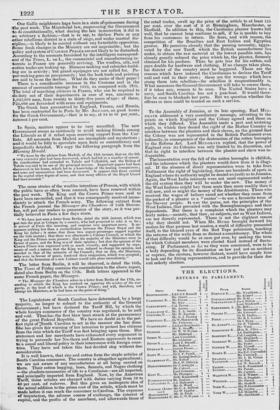The Legislature of South Carolina have determined, by a large
majority, no longer to submit to the authority of the General Government ; but have declared the Tariff Bill, by which the -whole foreign commerce of the country was regulated, to be null and void. Thus has the first blow been struck at the permanency of the great Federal Republic. We have no doubt as to the per- fect right of ',South Carolina to act in the manner she has done. She has given fair warning of her intention to protect her citizens from the ruin which the Tariff was fast bringing upon them. Her statesmen and her merchants have exhausted every argument in trying to persuade her Northern and Eastern oppressors to recur to a sound and liberal policy in their intercourse with foreign coun- tries. They have not taken this last decided step without due consideration.
It is well known, that rice and cotton form the staple articles of South Carolina commerce. The country is altogether agricultural; we are not aware of any manufactures at all being carried on there. Their cotton bagging, hoes, flannels, and Negro clothing —the absolute necessaries of life to a Carolinian—are all imported, and principally imported from England. Now, by the American Tariff, these articles are charged with duties varying from 30 to 40 per cent, ad valorem. But this gives an inadequate idea of the actual addition to the prime cost of the article, which must be made before it can reach the consumer in Carolina. The expenses of importation, the adverse course of exchange, the interest of capital, and the profits of the merchant, and afterwards those of the retail trader, swell up the price of the article to at least 125, per cent, over the cost of it at Birmingham, Manchester, or Sheffield. In addition to this, the Carolinian planter knows full well, that he cannot long continue to sell, if he is unable to buy from his customers in return. He fears, and with reason, the competition of the Brazilian and East Indian and Egyptian grower. He perceives already that the passing necessity,. aggra- vated by the new Tariff, which the British manufacturer lies under, to obtain the raw material at the lowest possible rate, has already greatly reduced the price which he, the planter, formerly obtained for his produce. Thus he gets less for his cotton, and pays double for hardware and clothing. If no change takes place, his district of the country must be beggared. These are• the reasons which have induced the Carolinians to declare the Tariff null and void in their state; these are the wrongs which have stung them into rebellion—for rebellion it unquestionably is. What measures the General Government will take to coerce them, if it takes any, remain to be seen. The United States have a navy, and South Carolina has not a gun-boat. It would there- fore be easy to blockade her ports. But we question whether the officers or men could be trusted on such a service.






















 Previous page
Previous page